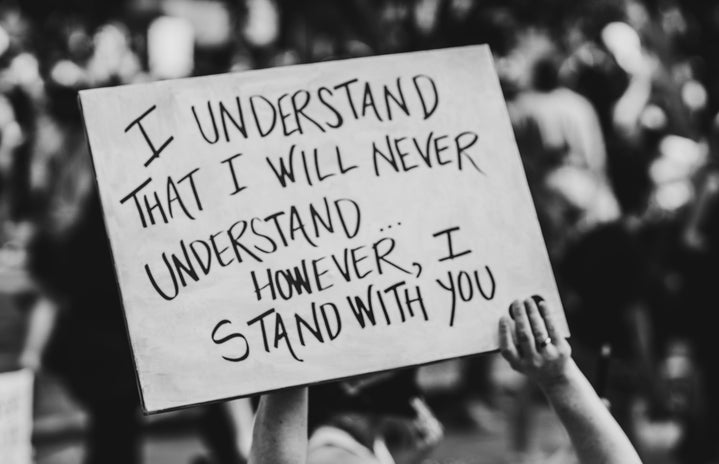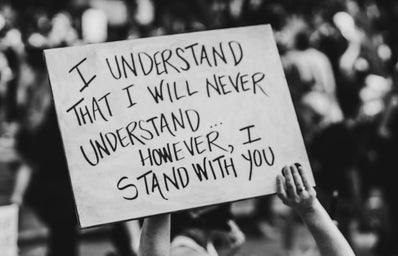I’ve known my ethnic identity since I was young. I am Palestinian. I also know that my race, Middle Eastern, often places me in situations where I’m either overlooked, misunderstood, or stereotyped. Growing up, my family would often talk about the prejudices we face as Palestinians—the racist jokes people would make about us, and how deeply those hurt. Some of my friends still make “terrorist” jokes today, and although they are intended to be lighthearted, they cut deeper than they realize. I think about my race and ethnicity every day because I know that, as a person of color, my identity makes me vulnerable to the kind of hate and violence that is so pervasive in American society. I don’t get to choose my identity, and I can’t hide it. And in America, there’s only one right answer to the question of race: White.
Growing up Palestinian, I faced the sting of being racially and ethnically othered, of having my identity reduced to stereotypes. It’s easy to internalize the racism around you when it’s something you face every day. But as I’ve gotten older, I’ve come to understand something much deeper—that America’s passive or neutral stance in the face of injustice is itself part of the problem. By turning a blind eye or offering weak responses to systemic oppression, the status quo is maintained. This is something I’ve learned to confront not just in my own life, but in the broader context of global injustice, especially when it comes to Palestine.
@mayuhnaise Ask yourself why you think Israelis deserve peace but Palestinians do not. For algo: #trending #skincare #grwm
♬ original sound – Maya – Ayooni
22-year-old Palestinian-American, Maya Abdallah, discusses the hatred Palestinians normally endure.
She uses her platform strictly to advocate for a free Palestine.
Beyond the daily micro-aggressions, there’s a larger, much more painful reality that I, and millions of others, carry: the ongoing suffering of Palestine. For the past 13 months, Palestinians have endured an intensified crisis marked by violence, displacement, and a devastating humanitarian catastrophe. And yet, despite this prolonged suffering, the world largely remains indifferent. This crisis is not new; it has been ongoing since 1948, when the creation of the state of Israel led to the forced displacement of Palestinians, setting the stage for decades of occupation, violence, and denial of basic rights. Yet, the international community remains passive, often turning a blind eye or offering only rhetorical support, while the situation continues to worsen.
One of the most significant aspects of the conflict is how Hamas is portrayed globally. The organization is widely labeled a “terrorist group,” but this designation is overly simplistic and politically charged. Like any other country with a military, Hamas maintains a structured defense force for Palestinians in Gaza. The group governs the region, and despite its controversial actions, it is the closest thing to a governing body Palestinians have in the besieged Gaza Strip. While Hamas’ tactics and ideology may be debated, reducing their efforts to a single label does not address the complexity of the situation or the conditions that led to their rise in the first place. Western media often presents a one-sided, negative view of Hamas and the Palestinian people, making it difficult to understand the complexities of the situation. The portrayal of Palestinians and their leaders is often so dark that it obscures their humanity. Why are they not seen as people? I truly cannot comprehend it.
One of the most harmful and persistent misconceptions in the media is the idea that Hamas “uses human shields“—that is, that they deliberately place civilians in harm’s way to provoke a response from Israel and to gain international sympathy. This narrative is frequently used to justify Israeli military operations, even when these operations result in large numbers of Palestinian civilian casualties. But the reality is far more complex—and the use of this “human shield” narrative distracts from the real issue: the Israeli military’s routine targeting of civilian infrastructure, including homes, schools, hospitals, and refugee camps. The truth is that, in Gaza, there are nowhere near enough “safe zones” to shield civilians from military strikes. Gaza is one of the most densely populated areas on the planet, with 2 million people crammed into a strip of land less than 139 square miles. So when Israeli forces target buildings in Gaza, there are civilians everywhere—often in the same buildings, neighborhoods, and streets where Hamas may be operating. To shift the blame onto Palestinians for these casualties—by framing them as “human shields”—is a dangerous oversimplification that distorts the true nature of the violence and shifts responsibility away from the occupier.
@yourfavoriteguy This is a problem: Americans truly have no idea how much of their money has been sent to 🇮🇱 over the past year #yourfavoriteguy
♬ original sound – YourFavoriteGuy
19-year-old Guy Christensen breaks down the funds America consistently gives to Israel.
The role of the United States in this conflict cannot be ignored. As Israel’s largest military and financial ally, the U.S. provides billions of dollars in aid to Israel each year, much of it directed toward military support. This funding bolsters Israel’s military capabilities, including its airstrikes on Gaza, the expansion of settlements in the West Bank, and its overall occupation of Palestinian territories. While the U.S. justifies this support as a means of maintaining stability in the Middle East, many argue that it enables the continued oppression of Palestinians and prolongs the cycle of violence. Despite growing calls from some American lawmakers and activists to reevaluate this aid, the financial support continues, fueling the very conflict that devastates Palestinian communities.
Now, let’s look at how Israel seamlessly brings harm to Palestine while America is distracted:
- Thanksgiving 11/23/23 – Israeli attack on Al-Shifa hospital, ruled out as a massacre.
- Christmas Day, 12/25/23 – Israeli attack on Maghazi refugee camp, ruled out as a massacre.
- New Year’s Day, 1/1/24 – 156 Palestinians, mainly women and children, killed in 24 hours.
- Superbowl, 2/11/24 – Israeli airstrikes on Rafah.
- Met Gala, 5/6/24 – Ground invasion in Rafah.
- Memorial Day, 5/27/24 – Tent massacre in “safe” zone.
- Presidential Election, 11/5/24 – IDF bans displaced Palestinians from returning home.
In this climate of shifting focus, it’s clear: as the nation tunes into its own distractions, the suffering of Palestinians continues unchecked.
@ajplus Actor Andrew Garfield spoke up for Palestinians in Gaza at an event at NYC’s 92NY, which has silenced criticism of Israel in the past. #AndrewGarfield #NYC #Palestine #Gaza #Israel #Palestinian #Writing #SpiderMan
♬ News program, serious BGM of Nareback – Whistle Grandpa
41-year-old Jewish actor Andrew Garfield speaks out about the ongoing crisis in Palestine, using his platform to advocate for justice and human rights.
Despite widespread outcry and the efforts of many who speak out, the world’s attention to the crisis in Palestine often feels fleeting and ineffective. For all the calls for justice, the situation remains largely unchanged, with violence and suffering ignored by those in power. The deep frustration is not only about the silence of decision-makers, but about the endless cycle of empty promises. Even as more people care, the lack of meaningful change makes it seem as though these cries for justice are falling on deaf ears.
In light of this ongoing and prolonged crisis, it’s more important than ever for us to take action and show solidarity with those who are suffering. As college women, we have a unique opportunity to make a meaningful impact. One way to do so is by supporting Ayooni by Maya, a shop inspired by Palestinian culture where your purchase directly contributes to relief efforts. A portion of all proceeds is donated to a nonprofit organization that is feeding Gaza, as well as personal GoFundMe campaigns to support our brothers and sisters making their way out of Gaza. The nonprofit recipient will be announced soon on Abdallah’s Instagram, so you can see exactly where your contributions are going.
In addition to shopping, there are other ways to provide direct support. You can donate to this fundraiser, which focuses on humanitarian aid in Gaza, or contribute to Save the Children’s campaign, which helps provide critical assistance to children in Gaza and the West Bank. Whether through a purchase or a donation, every small action counts. Let’s come together and stand in solidarity with Palestine, using our voices, our resources, and our purchasing power to help create real, lasting change.
The suffering of Palestinians, both in Gaza and the West Bank, is part of a long, ongoing struggle for dignity, sovereignty, and human rights. Yet, despite the deep pain and injustice, the world continues to turn a blind eye, while the U.S. remains complicit through its financial and political support of Israel’s military actions. As a Palestinian, I ask: Why does Palestine seem so unimportant to the world? Why does the international community remain silent in the face of such overwhelming suffering? These questions echo in the hearts of many Palestinians, whose voices remain unheard and whose cries for justice continue to be ignored. Until the world chooses to act, the cycle of violence, displacement, and oppression will persist, and the question of Palestine will remain unanswered.


